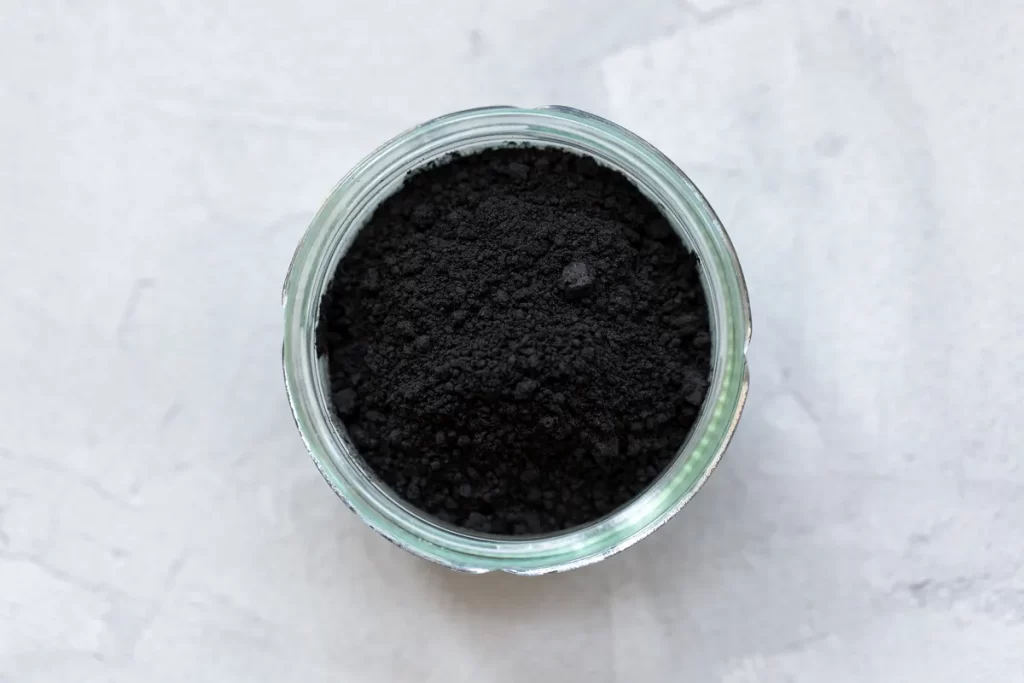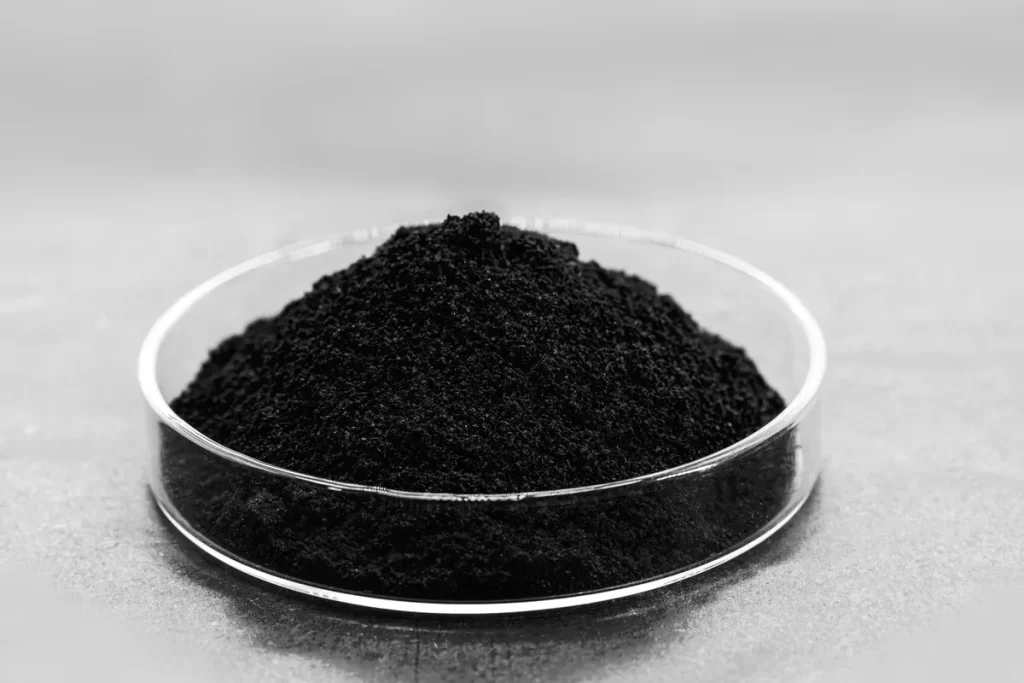CarboNext 20: With particle size between N550 and N660 and lower structure, it features high purity, optimized rubber filler dispersion, and improved surface smoothness. Suitable for automotive wiper blades, hoses, and products requiring long-term operational stability.
Carbon black
Carbon Black (Also Known as Furnace Black)
Carbon black is a fine black powder produced by burning hydrocarbons with limited oxygen. It’s raw materials are mainly derived from petroleum (residual oil) and coal tar.

ASTM Standard Carbon Black
The ASTM standard classifies carbon black into different grades based on its performance in specific applications.

PCBL Exclusive Carbon Black
A high-performance carbon black series developed by PCBL (Phillips Carbon Black Limited).

Other Specifications
Can’t find the grade you’re looking for? Contact us for assistance!
Three Key Features of Carbon Black in Rubber Reinforcement

Reinforcement Enhancement
Improves rubber strength, abrasion resistance, and tear resistance, extending product lifespan, such as in tire treads

Conductivity Adjustment
Conductive carbon black provides antistatic and conductive properties, suitable for ESD mats, conductive seals, and other applications.

UV Protection & Weather Resistance
Absorbs UV radiation, preventing rubber aging and degradation, making it ideal for seals, cable sheathing, and outdoor products.
Carbon black is widely used in tires, plastics, coatings, inks, and electronic products, offering excellent reinforcement, conductivity, and UV resistance. Phillips Carbon Black Limited (PCBL) was established as a joint venture between Phillips Petroleum (USA) and India, making it the sixth-largest carbon black manufacturer globally. PCBL uses a petroleum-based production process, ensuring high-quality and stable supply without coal tar, preventing impurities. Its raw materials come from a single oil field in Louisiana, USA, maintaining consistent quality since its inception.
Kind Snail Co., Ltd. officially became the exclusive distributor of PCBL in Taiwan in 2023, helping Taiwanese businesses navigate the U.S.-China trade war by offering India-based supply chain alternatives.
| Abbreviation | Full Name | ASTM Carbon Black Grades |
|---|---|---|
| SAF | Super Abrasion Furnace Black | N110,N115,N121,N134,N220 |
| ISAF | Intermediate Super Abrasion Furnace Black | N231,N234 |
| HAF | High Abrasion Furnace Black | N326,N330,N339,N347,N351,N375 |
| FEF | Fast Extrusion Furnace Black | N550 |
| GPF | General Purpose Furnace Black | N650,N660 |
| SRF | Semi-Reinforcing Furnace Black | N762,N772,N774 |
Hard Carbon Black
It refers to carbon black with smaller particle size (10–30nm) and higher structure, offering excellent reinforcement and abrasion resistance. The main types include SAF, ISAF, and HAF, commonly used in tire treads, drive belts, industrial rubber, and wear-resistant shoe soles, enhancing rubber strength and durability.

N110: Abbreviated as SAF, provides excellent tear resistance, abrasion resistance, and high tensile strength. Suitable for off-the-road (OTR) tires, bus and truck treads, and ultra-durable rubber products.

N115: Abbreviated as SAF, provides ultra-high reinforcement with excellent tear resistance, cut resistance, and crack resistance. Suitable for truck tires, mechanical rubber products, and off-the-road (OTR) tire tread compounds.

N121: Abbreviated as SAF, provides excellent reinforcement with superior abrasion resistance, durability, and slip resistance. Suitable for passenger car, truck, and bus treads, as well as ultra-durable rubber products.

N134: Abbreviated as SAF, provides outstanding rubber reinforcement with excellent abrasion resistance and durability. Suitable for premium truck tires, bus tires, off-the-road (OTR) tires, and high-performance tread applications.

N220: Abbreviated as SAF, provides high tensile strength and excellent abrasion resistance. Suitable for tire treads, enhancing wear resistance, traction, and service life.

N231: Abbreviated as ISAF, provides excellent reinforcement and good tear resistance. Suitable for off-the-road (OTR) tire treads, conveyor belts, and mechanical rubber products.

N234: Abbreviated as ISAF, provides excellent reinforcement and good extrusion performance. Suitable for high-performance truck, bus, and passenger car treads, solid tires, and wear-resistant mechanical rubber products

N326: Abbreviated as HAF, provides high elongation, flexibility, and tear resistance. Suitable for tire carcasses, tire belts, truck tire ply compounds, coatings, inks, and mechanical rubber products.

N330: Abbreviated as HAF, provides high resilience, good processability, and excellent tensile strength. Suitable for tire treads, carcasses, bead compounds, ply compounds, solid tires, conveyor belts, and various molded rubber products.

N339: Abbreviated as HAF, provides excellent processability, making it suitable for tire treads, carcasses, bead compounds, solid tires, molded rubber products, and conveyor belts. It offers high abrasion resistance and good dynamic performance.

N347: Abbreviated as HAF, provides moderate tensile strength and excellent processability. Suitable for passenger car treads, carcass compounds, conveyor belts, and molded rubber products, offering good abrasion resistance and low heat buildup characteristics.

N351: Abbreviated as HAF, provides excellent abrasion resistance and processability. Suitable for truck treads, mechanical rubber products, hoses, conveyor belts, seals, wiper blades, flooring, footwear, and vibration damping components, offering superior dynamic performance.

N375: Abbreviated as HAF, provides excellent wear resistance and reinforcement performance. Suitable for tire treads, conveyor belts, hoses, hose covers, and molded rubber products, offering good abrasion resistance and low heat buildup characteristics.
Soft Carbon Black
It refers to carbon black with a larger particle size (30–70nm) and lower structure, offering lower reinforcement but better processability. The main types include FEF, GPF, and SRF, commonly used in tire sidewalls, inner tubes, rubber hoses, seals, and cable sheathing, enhancing rubber flexibility, crack resistance, and aging resistance.

N550: Abbreviated as FEF, is a fast extrusion furnace black with moderate wear resistance and good processability. Suitable for tire inner liners, hoses, and cable sheathing, ensuring product quality and durability.

N650: Abbreviated as GPF, provides moderate reinforcement and is suitable for mechanical rubber products, extruded parts, and hoses. It offers good extrusion properties and dispersion, enhancing product quality.

N660: Abbreviated as GPF, offers moderate reinforcement and excellent processability. Suitable for tire belt layers, shoe soles, and seals, it reduces heat buildup and enhances fatigue resistance.

N762: Abbreviated as SRF , offers high resilience and excellent processability. Suitable for extruded products, hoses, and tire inner liners, ensuring product stability and durability.

N772: Abbreviated as SRF , provides high resilience and good dynamic performance. Suitable for seals, engine gaskets, and hoses, enhancing product performance and lifespan.

N774: Abbreviated as SRF , offers high resilience and flex resistance. Suitable for hoses, tire inner liners, and seals, enhancing processability and durability.
PCBL Specialty Carbon Black

CarboNext 10: With particle size between N774 and N660 and lower structure, it is designed for rubber applications. Featuring high purity and low hysteresis loss, it enhances filler dispersion and processability. Suitable for automotive hoses (engine mounts and vibration isolators) and industrial rubber products (anti-vibration pads and damping materials).

CarboNext 40: With smaller particle size than CarboNext 10 and CarboNext 20 and higher structure, it is a low-surface-area reinforcing filler. Suitable for rubber profiles and hoses, offering low viscosity, excellent processability, and superior surface smoothness.

P435: A high-purity, medium specific surface area, and high-structure fast-extrusion reinforcing carbon black. It provides high modulus and excellent extruded surface smoothness. Suitable for rubber profiles and hoses, it features moderate viscosity, low die swell, and outstanding processability, ensuring both durability and stability in the final product.

N550LG: Features a smooth particle surface, making it ideal for extruded products and hoses. It provides moderate viscosity and low die swell, improving processing efficiency. Compared to N550, N550LG offers higher purity (ash content: N550LG ≤0.5% vs. N550 ≤1.5%), more uniform particles, and reduced impurity interference, enhancing product stability and processing performance.

N660LP: Features low particle hardness, offering excellent processability and dispersion. Compared to N660, N660LP has lower heat loss (N660LP ≤1.5% vs. N660 ≤2.5%) and lower particle hardness (20gf), reducing heat buildup and improving processing stability. It is particularly suitable for tire inner liners, tubing, and seals.
Can't find the grade you're looking for?
You can contact us through the form below, and we will assign a specialist to assist you.


